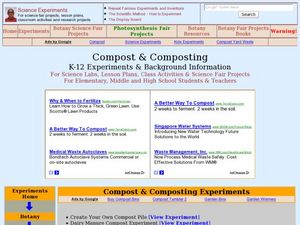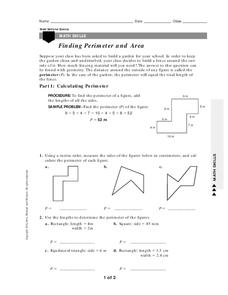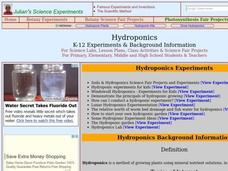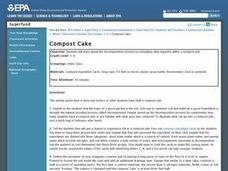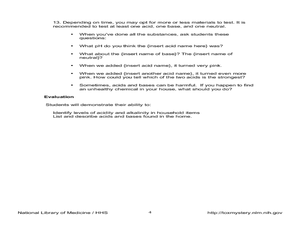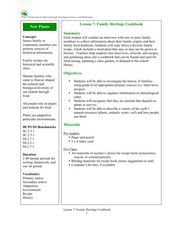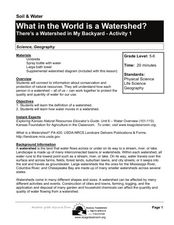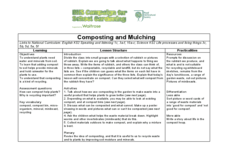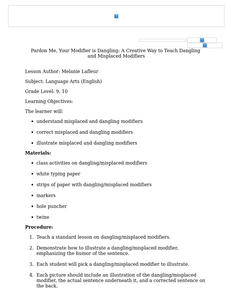Curated OER
Compost and Composting Experiments
Students investigate the composting process through a variety of experiments. In this ecology lesson, students discuss the benefits of composting. They examine how compost affect plant growth.
Curated OER
Finding Perimeter and Area
For this area and perimeter worksheet, students are given the equations to find the perimeter and area of objects. They practice finding the perimeter by measuring the sides of given objects and adding them together. They find the area...
Curated OER
Hydroponics
Learners examine how to grow plants using a hydroponic system. In this hydroponics lesson students identify the advantages and disadvantages of growing plants hydrologically.
Curated OER
Growing Plants in Science and Literature, More Than an Empty Pot
Young scholars read The Empty Pot as an introduction to plants. In this planting lesson plan, students understand a sequence of events in the book and relate it to the sequence of a plants life. Young scholars grow plants and record...
Curated OER
Compost Cake
Young scholars examine the decomposition process. They create their own class compost pile and record their observations. They discover which materials decompose at a different rate.
Curated OER
PLANT LIFE CYCLES
Student learns about the life cycle of plants by watching a time-lapse video. This activity provides students with further evidence that all living things grow and change as they progress through their life cycle. Student conducts a...
Curated OER
Causal Patterns in Ecosystems Section 3
Students design and create a worm and worm free compost tanks for observation of decay in ecosystems. They make predictions, care, and revist tanks using their journals for observation and data collection.
Curated OER
THE PEANUT WIZARD
Students read information about George Washington Carver and outline the information. They are given peanuts in the shell, students examine them and eat them. Students discuss the following questions: Why did George Washington Carver...
Curated OER
Diaper Inquiry
Fifth graders carefully examine and investigate the products contained in a diaper. They particularly analyze the crystal sodium polyacrylate, a product developed for use in astronaut diapers. They follow the scientific method, forming...
Curated OER
Landforms in a Tub
Fifth graders use common household items to build landforms and simulate weathering and erosion.
Curated OER
The Greening of Mars: The Changes Necessary to Sustain Life on Mars
Fifth graders discuss the currents conditions on the planet of Mars. In groups, they work together to develop a mechanism that allows for a balanced ecosystem to survive on the planet. After presenting their ideas to the class, they...
Curated OER
Insects: Bug Off
Young scholars design and conduct an experiment to test three organic pesticides to control ants. They view a video that demonstrates ant behavior and the role of pesticides in insect control. In small groups, they set up behavior...
Curated OER
Diaper Challenge
Students compare the absorbency of a regular diaper and a swim diaper in fresh water and salt water. In this absorbency lesson plan, students mass the diapers and place them in water and determine the change in mass. They do the same...
Curated OER
Acid or Base? Toxie's on the Case
Students recognize the difference between acids and bases. In this ToxMystery lesson, students play a computer game and experiment to find the difference between acids and bases. Students use litmus paper to determine if household...
Curated OER
Family Heritage Cookbook
Students compare favorite family recipes. In this cultural diversity lesson plan, students interview family members and record favorite recipes. Students examine cultural diversity through favorite foods.
Curated OER
What in the World Is a Watershed?
Students discover the role of a watershed. In this geography lesson, students are shown a diagram of a watershed and discuss the definition of a watershed. Students demonstrate the role of a watershed by using an umbrella and spraying it...
Curated OER
Composting and Mulching
Second graders define composting and recognize what can be composted. In this composting and mulching lesson, 2nd graders classify objects or pictures as good or bad for composting. Students write a story about life in the compost...
Curated OER
Top 10 Summer Science Lesson Plans
Make this summer an exciting learning experience for your students with these engaging science activities!
Curated OER
Dangling Modifiers
Learners identify misplaced and dangling modifiers and correct these errors in their writing. They create illustrations to match the misplace and dangling modifiers.
Curated OER
Beautiful Bugs
Students investigate the life cycle of ants, ladybugs, and butterflies. They list the four stages of the butterfly life cycle, define symmetry and observe how ants make homes in dirt.
Curated OER
Sunflower Sundance
First graders study sunflower plants and identify its parts. They plant sunflower seeds and watch them grow and make sunflowers out of paper plates and colored paper. They watch videos and visit websites about sunflowers.
Curated OER
A Hidden Beauty
Expose the beautiful mystery of bulbs as young botanists learn all about these fascinating plants. They glean information from a short text before observing actual bulbs (consider an onion), and comparing their findings with predictions....
Curated OER
Mixture Word Problems
In this algebra worksheet, students solve word problems related to mixtures. They figure out cost per kg, concentration of chemicals and percent of mixtures. There are 12 problems with an answer key.
Curated OER
Lettuce Us Be Different
Learners evaluate their differences, then look at differences in plants. In this class team building and life science lesson, the class play a game that focuses on similarities and differences in the group, then students plant three...


